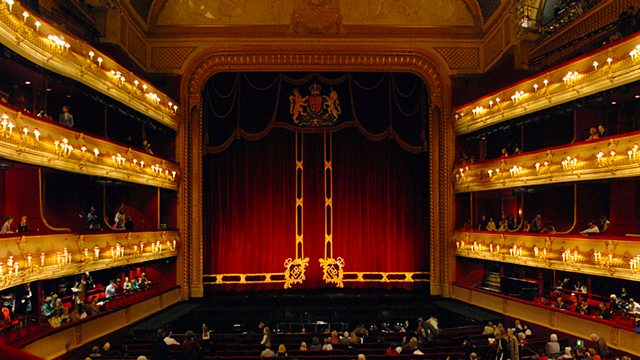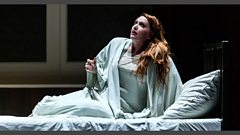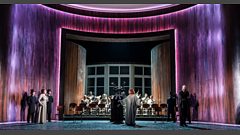
Strauss: Die Frau ohne Schatten
Live from the Royal Opera House, Covent Garden, Semyon Bychkov conducts Strauss's opera Die Frau ohne Schatten, starring Johan Botha, Emily Magee and Michaela Schuster.
Richard Strauss's opera Die Frau ohne Schatten (The Woman without a Shadow) live from London's Royal Opera House, conducted by Semyon Bychkov in a new production by Claus Guth, starring Johan Botha, Emily Magee, Michaela Schuster, Johan Reuter and Elena Pankratova.
Presented by Donald Macleod with guest, Strauss expert William Mival. Including interviews with the conductor, director and singers.
On the surface, the opera is a fairy tale about two contrasting couples and how love can only be truly fulfilled and meaningful through the birth of children. This narrow world view has possibly been the reason why some people have found the story uncongenial. For a long time is was one of the less performed of Strauss's works. However in recent productions the complex web of symbols at work in the piece have been deconstructed to reveal layers of meaning about the nature of love and human psychology.
Emperor ..... Johan Botha (Tenor)
Empress ..... Emily Magee (Soprano)
Nurse (Amme) ..... Michaela Schuster (Mezzo-soprano)
Barak ..... Johan Reuter (Baritone)
Barak's Wife ..... Elena Pankratova (Soprano)
One-Eyed Brother ..... Adrian Clarke (Baritone)
One-Armed Brother ..... Jeremy White (Bass)
Hunchback Brother ..... Hubert Francis (Tenor)
Spirit Messenger ..... Ashley Holland (Baritone)
Voice of a Falcon ..... Anush Hovhannisyan (Soprano)
Apparition of a Youth ..... David Butt Philip (Tenor)
Guardian of the Threshold ..... Dusica Bijelic (Soprano)
Voice from Above ..... Catherine Carby (Mezzo-soprano)
Royal Opera House Orchestra
Royal Opera House Chorus
Conductor, Semyon Bychkov
*1800 Act 1
*1905 First interval (including artist interviews)
*1930 Act 2
*2030 Interval 2 (including artist interviews and an extended interview with tonight's conductor, Semyon Bychkov)
*2055 Act 3.
Last on
More episodes
Previous
Clip
-
![]()
Strauss: Die Frau Ohne Schatten - Opera Guide
Duration: 09:01
Act I
The Emperor of the South Eastern Islands has married the Spirit King’s daughter, a beautiful maiden whom he had wounded and captured in the form of a white gazelle. Since her marriage, she has lost her magical powers and can no longer shapeshift to an animal, but she is still not fully part of the mortal world. The fact that she has no shadow symbolizes the infertility of her love. This pleases the Nurse, who has followed her from the spirit realm and who hates the mortal world and the Emperor. The Spirit King, angered, sends secret messengers to confer with the Nurse. The Emperor and Empress, knowing nothing of this, pass blissful nights together. During the day, however, the Emperor goes hunting, leaving his wife alone with the Nurse.
��
One morning a falcon with a talisman in its claws circles above the secluded summerhouse where the Empress is kept isolated from human society. It is the Emperor’s favourite falcon, which he drove away after it helped him hunt down the white gazelle. The Empress hears its lament: ‘Time is running out, and still the woman throws no shadow, so the Emperor will be turned to stone’. The meaning is clear to her: she has left the spirit world, but the Emperor’s jealous love has not sufficed to receive her completely into the mortal world. Thus she is suspended between the two; the curse, however, is not upon her, but upon her husband, brought about by his selfish love. Appalled, the Empress decides to find a shadow, at whatever cost, and begs the Nurse to help her. The Nurse, with her keen demonic knowledge of the human world, knows that there are certain predicaments from which an unfortunate mortal can escape only by forfeiting his or her shadow. The pair set off for the world of men. Barak the dyer is no longer young, but he is a hard worker and strong. He supports his young, pretty and discontented wife and three crippled brothers. He would like to have a throng of children to support, as well, but his marriage, like the Emperor’s, is childless.
��
The Empress and the Nurse, disguised as servants, enter Barak’s humble home. The Nurse realizes immediately that the sullen young wife would be ready to sacrifice her shadow – and thus her unborn children –for fine clothes, jewels and ardent suitors. She charms and flatters the young woman, winning her confidence by conjuring up visions of luxury and a wondrous feast. Barak’s wife agrees to the exchange. The Empress scarcely comprehends the terrible bargain by which she is to profit. The pact is made, and the Empress and Nurse vanish abruptly, leaving Barak’s Wife alone. From the frying-pan, where seven magical fish are simmering, the Wife hears the voices of�� her unborn children lamenting. Terrified, she staggers to the bed. The unsuspecting Barak returns to find the marriage bed divided in two, as the Nurse instructed the Wife. Voices are heard from outside, as the Nightwatchmen extol marriage and parenthood:
Ye wedded folk, lying in each other’s arms, you are the bridge against the great abyss, on which the dead return again to life!
Blessed be the fruit of your love!
Barak and his Wife lie silent in their separate beds.
Act II
The ordeals begin. Both couples must be purified: Baral and his wife are too closely bound to dull earthliness, while the Emperor and his Wife are too proud and distant from the earth. To lure Barak’s Wife to complete the pact, the Nurse summons up the apparition of a handsome youth. Barak’s Wife imagines that she hates her stolid, kindhearted husband, so to betray him would be a small matter –but nevertheless she cannot do it. The Nurse continues to tempt her. Barak has no idea of the turmoil in his house but he is unhappy; he feels threatened in some obscure way, as if something were crying out to him for help. Could it be the voices of his unborn children? For it is their lives that are at stake – and the Wife’s shadow.
��
The Empress is innocent and yet guiltily involved in the Nurse’s bargain. With ambivalent feelings she spends her days in Barak’s hut. At night in the Emperor’s falcon house she dreams fearfully of her husband roaming the desolate forest, alone in his pride, consumed with jealousy and suspicion, his heart already turning to stone; she sees him, distraught, entering the gate of a temple – to meet with what fate? The answer is given by her own fears as the falcon’s cry echoes through her dreams: ‘The woman throws no shadow, the Emperor must be turned to stone’. The Empress awakes with a start from her dreams, her heart pounding with fear and grief. Her days are even more fraught with danger than her nights. No child of the spirit realm can dwell with impunity among earthly people; unlike the demonic Nurse she is unprotected in their presence. Yet deep down she is drawn to the earth people that she meets: she is moved by Barak’s suffering and begins to feel guilty that he, all unsuspecting, is being cheated of his happiness.
��
The third day comes, with lowering darkness that seems to threaten heaven and earth. The Nurse urges fulfillment of the pact. Barak’s brothers moan with terror and his Wife babbles hysterically, telling her husband that she has a lover (which is not in fact true) and that she has sold her shadow, thus renouncing her unborn children. Barak orders his brothers to light a fire, and cries out with horror as he realizes that his Wife casts no shadow. The Nurse rejoices: the pact is fulfilled. The Wife has given up her shadow, but the Empress will not snatch it up. The hitherto mild Barak, now impressive in his anger, pronounces the death sentence. A sword springs mysteriously into his hand –is it sent by his unborn children? The Nurse is uneasy and feels that higher powers, for which her demonic cunning is no match, are taking over. The Empress still refuses the shadow and stretches her arms towards heaven. Barak’s wife throws herself before him, ready to die at
his hand. Magical powers are released: Barak’s hut collapses, Barak and his Wife vanish, Barak’s brothers lament and the Nurse wraps the Empress in her cloak and leaves with her in a boat, which has magically appeared.
Act III
The spirit world now surrounds the protagonists. The Nurse watches over the sleeping Empress as their boat arrives at the entrance to a temple in the mountain. Trumpets sound. The Empress wakes, realizes that the summons is for her and enters the temple. Barak and his Wife, underground, are unaware of each other’s presence, as they are separated by a wall. Commanded by a voice, they ascend to a higher level. They remain unaware of each other’s presence, but both think with longing of each other. Barak humbly offers his Wife forgiveness, while she for the first time discovers her love for him. The Nurse is refused entry to the temple by the Spirit Messenger. She encounters Barak and his Wife and, consumed with rage, sends each in the opposite direction round the temple so that they cannot find each other. Barak and his Wife pitifully cry to each other. The Empress hears them in the inner sanctum of the temple, where she awaits a judgement – but who sits in judgement? Is it her stern father, King of the Spirits? The figure is hidden by a curtain and there is no reply when the Empress takes courage and speaks; all that can be heard are the cries of Barak and his wife, and the murmur of a golden stream of water, the water of life. ‘Drink’, calls a voice from above. ‘Drink and the woman’s shadow will be yours’. The Empress draws back�� without drinking. The water recedes and she sees the Emperor, turned to stone except for his eyes, which are fixed upon her in desperation. Ghostly menacing voices repeat ‘The woman throws no shadow, the Emperor will be turned to stone’. The water springs up once more, and a voice coaxes the Empress to drink, promising that her husband will be free if she does so. Torn by her own desires, and moved by the despairing cries of Barak and his wife, the Empress brings herself to refuse. Thus she is victorious for herself, for the Emperor (who would otherwise have remained a statue) and for the couple purified through suffering and elevated from dull earthliness. The Empress casts a shadow across the temple floor, and the Emperor gets up from his throne and comes to meet her. The voices of the unborn children rejoice, joined by the Emperor and Empress and Barak and his Wife, now at last reunited. The temple dissolves as the children’s voices sing of hope for the future.
��
Hugo von Hofmannsthal
A version of this synopsis was used in the programme for the 1992 Salzburg Festival
Broadcast
- Sat 29 Mar 2014 17:50���˿��� Radio 3


